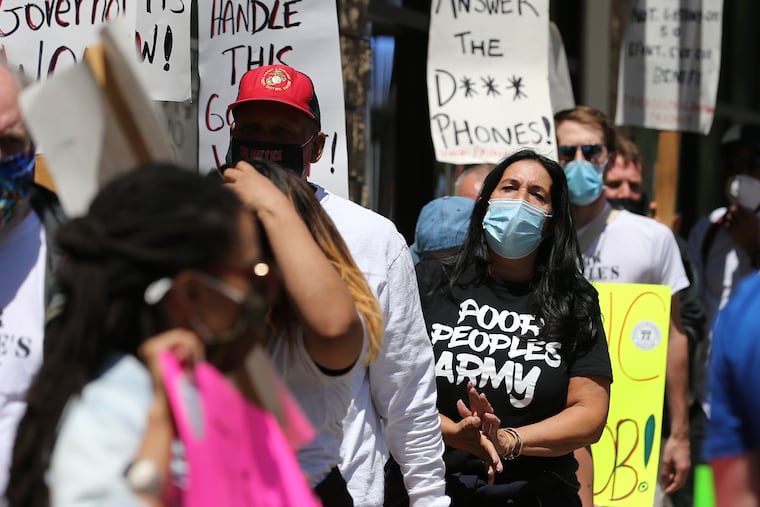Pa. and N.J. jobless workers just lost their unemployment benefits as federal aid expired
Nearly 500,000 Pennsylvania workers were affected by the expiration of federal unemployment benefits, according to one estimate.

For 35 years, Mike Miller and his wife, Marie, earned a living by singing in nursing homes, and entertaining seniors with covers of Dean Martin and Frank Sinatra. COVID-19 dried up their business, but the Millers didn’t qualify for regular unemployment benefits because they’re self-employed.
They were lucky in being able to rely on Pandemic Unemployment Assistance (PUA), a federal program that provides aid to those who don’t typically qualify for unemployment compensation. The federal help was a “godsend,” Mike Miller said, helping the couple pay the mortgage, car loan, and other bills. Nursing homes still haven’t allowed the entertainers to return because of the virus, he said.
» READ MORE: Enhanced federal unemployment benefits for the pandemic end. Here are the assistance programs that can still help.
“It really got us through the past year,” said Miller, 69, of Erie. “And it’s now stopped.”
The Millers are among the millions of Americans who lost their jobless benefits this week when federal programs put in place during the pandemic expired over Labor Day weekend. More than 11 million people were cut off, by one estimate from Oxford Economics. More than 653,000 Pennsylvania workers lost all or some of their benefits, according to the state Department of Labor & Industry. Almost 400,000 New Jersey workers were affected, according to projections in August by the Century Foundation, a left-leaning think tank.
In addition to PUA, another federal program that gave benefits to those unemployed for more than six months ended Monday. A $300 weekly supplemental benefit also ran out. And an extra $100 a week to people with at least $5,000 in net income from self-employment expired.
All told, the federal government injected roughly $650 billion into jobless benefits since the pandemic, according to the nonpartisan Committee for a Responsible Federal Budget.
Although the White House has encouraged states to keep paying the $300 weekly benefit by using money from federal stimulus bills, no states had done so as of Monday. Many states even opted out of the federal program early after some businesses complained that they couldn’t find enough people to hire. Data have shown minimal economic benefits from cutting off aid early in those states.
The ending of these programs comes as the U.S. economy has recovered from the pandemic, but with substantial gaps in the recovery. The Labor Department says there are still 5.7 million fewer jobs than before the pandemic. Yet the department also estimated, last month, that there were roughly 10 million job openings.
Pennsylvania workers losing the aid said they’re preparing to cut expenses or dip into their savings to get by. They said they haven’t found jobs in their industries or are unable to work for other reasons.
Dean Webley, a 53-year-old from Belmont Village in Philadelphia, runs a business selling such leather goods as wallets and pocketbooks. She sells items online, but has seen far fewer customers at flea markets or her home since the pandemic. She collected nearly $500 a week in federal unemployment benefits until Monday, but the market for her business still has not recovered, Webley said.
Making matters worse, her son was sent home to study remotely this week after a teacher tested positive for COVID-19, she said. Being available for her son is one reason why it makes no sense, for now, to take a low-wage job outside her industry, she said.
“I might at some point in time, if things get bad, desperate,” she added.
Miller, the singer, said he and his wife collected almost $1,000 a week in combined unemployment benefits, more than the $800 a week they earned playing shows. They will use some of their savings and Social Security benefits to get by, but are unsure how far that will get them.
If coronavirus cases had continued to decline, this week would have been a good time to sunset the federal benefits, Miller said.
“But with this other variant happening and the hospitals around here are getting full, it doesn’t make sense,” he said. “We’re almost back to where we were last summer with the infections and stuff and people dying, and they cut off the needed benefit. I don’t understand the reasoning behind that.”
This article contains information from the Associated Press.